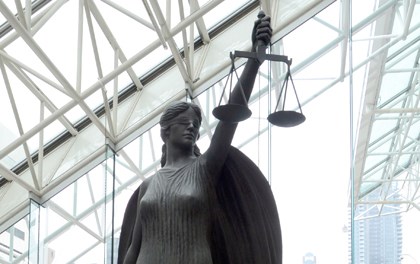The North Vancouver woman accused of running a hostel out of her Central Lonsdale townhouse is pushing back against the city’s attempt to have her shut down.
The city filed a petition in court last month, asking for a declaration that Emily Yu was violating the city’s zoning and fire bylaws as well as an injunction ordering Yu to cease advertising and taking bookings from guests.
But Yu has filed a response arguing she has done nothing wrong. Yu claims boarders are allowed as an “accessory use” under the city’s rules, as long as the home is someone’s principal residence. With the exception of three days in August when she had three guests staying in her home, Yu has been living with only two roommates, not transients or boarders, the response continues.
(A separate affidavit filed by Yu claims it was six days that she had boarders.)
Since July 24, the townhouse has been free of any large furniture in hallways or landings, she added. And Yu denies describing her home as a hostel in advertisements.
Prohibiting Yu from advertising her home for boarders would be a violation of her Charter right to freedom of expression, she argues.
“The City of North Vancouver has no legal basis and no authority within the bylaws allowing it to seek an order preventing (Yu) from advertising short-term guest accommodation, taking bookings from guests, or using the townhouse for short-term guest accommodation,” her response states.
Earlier this month, Yu was in North Vancouver provincial court, asking a judge to toss out evidence gathered by City of North Vancouver bylaw officers under a search warrant.
In court Sept. 6, Yu told Judge Bonnie Craig that she was given no notice before bylaw officers showed up at her door on March 28. Yu told the judge that under the Community Charter, owners must be given reasonable notice by municipal officers before entering a residence with a warrant unless there is an emergency. In this case “I never got any warning,” she said.
Yu said the bylaw officers didn’t have any “compelling reason” to enter her townhouse but rushed in anyway and took photographs.
“I felt my rights were being violated by authority,” she said.
But the judge told Yu she would have to make her request in B.C. Supreme Court, the jurisdiction where all of the city’s court documents had been filed.
Both Yu and city lawyer Michael Moll declined to comment further outside the court.
Meanwhile, Airbnb says Yu has been permanently barred from using their site. The company issued a temporary ban pending its own investigation when news about the hostel first broke in June.
Residents at the complex noticed that it had since reappeared in recent weeks and disappeared again. According to the company, its software automatically detects and removes duplicate listings that have been prohibited.
“The overwhelming majority of Airbnb hosts and guests are good neighbors and respectful travellers. We have permanently banned this user from the platform, hosting is a serious responsibility and those who fail to meet our community standards will be removed from the Airbnb community,” said Lindsey Scully, Airbnb spokeswoman.
As of Sept. 19, four rooms in Yu’s home with space for up to 12 guests were still being advertised for rent at homestay.com.



